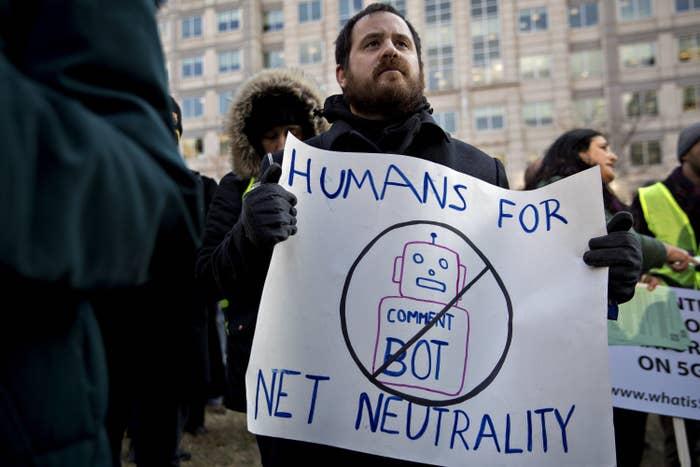
To sway the outcome of a major public policy decision, the US broadband industry funded companies that engaged in fraud on a huge scale, according to a scathing new report by the New York attorney general.
The report’s findings echo those from a 2019 BuzzFeed News investigation, which dug into millions of fake public comments submitted — supposedly on behalf of individual citizens — to the Federal Communications Commission in 2017 to oppose the policy of “net neutrality.”
The attorney general found that the industry campaign “resulted in over 8.5 million fake comments,” accounting for nearly 40% of the total the FCC received on the record-breaking docket. Despite concerns about the process, the federal agency repealed the net neutrality rules that the Obama administration had pushed for.
The new report describes efforts funded by the industry group Broadband for America to generate fake grassroots support, a practice known as “astroturfing,” that “relied on for-profit ‘lead generation’ firms — businesses that collect names, contact information, and other personal information from consumers and sell that information to third parties.” It continues, “In each case, the lead-generation companies responsible for getting individuals to sign on to these comments simply resorted to fraud in order to meet their goals.”
The debate over how the federal government should regulate internet providers attracted a surprising amount of attention, with both sides claiming it would shape the web for decades to come. But it also showed how easily deep-pocketed corporate interests could corrupt a democratic process. The comments that the broadband industry paid to generate, in hopes of influencing the FCC’s decision, ended up being one of the most prolific cases of impersonation in US political history. Today's statement from the attorney general is the most explicit yet to detail how that process unfolded and to raise a warning about how easily it could happen again.
In one case, Broadband for America hired a political consultancy, which hired another company, which hired “a small California-based digital advertising company” that “claimed it could place advertisements for the comment campaign on websites across the internet and then collect individuals’ names, contact information, and consent to submit a comment to the FCC on their behalf.” The report does not name the advertising firm, but in previous reporting BuzzFeed News has identified it as LCX Digital.
The advertising firm claimed that its ads convinced more than 1.5 million people to have comments submitted to the FCC in their names, according to the report.
“In fact, none of these people had done so,” investigators determined, in findings that mirror those published by BuzzFeed News. “The advertising company had simply copied the names and contact information of approximately 1.4 million people from records that had been stolen in a data breach and dumped online in 2016. For most of the remaining comments — approximately 100,000 — the advertising company brazenly copied information it had provided” to one of the intermediary companies “just a year earlier for comments in a different FCC regulatory proceeding.”
The report says that “red flags were ignored” by the industry’s campaign organizers, but that the state “has not found evidence” to indicate “that the broadband companies that funded and organized these lead generators had direct knowledge of fraud.”
Neither LCX nor Broadband for America responded to requests for comment.
New York’s investigators determined that the advertising company worked on at least three other advocacy campaigns in which it “fabricated all or nearly all of the records of consent.”
The attorney general said it has entered into settlement agreements with three other companies that between them were responsible for some 5.4 million comments, “all or nearly all of which were fraudulent.” The settlements “require the companies to adopt comprehensive reforms in future advocacy campaigns and pay more than $4.4 million in penalties and disgorgement.”
The attorney general said its investigations are ongoing, but did not name specific targets.
